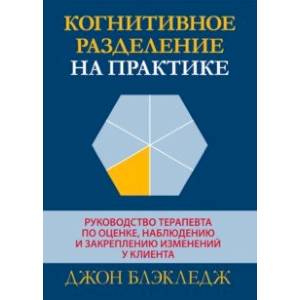Cognitive division into practice. The management of the therapist on the assessment, observation and consolidation
Please sign in so that we can notify you about a reply
The necessary book for everyone who practices the treatment of acceptance and responsibility (ACT)!
Most psychologists are familiar with the concept of cognitive separation, which is based on the assumption that many of our thoughts, especially about ourselves (for example, "I"m not good enough", "something is wrong with me, etc) , do not correspond to reality. Cognitive separation techniques are used to weaken the influence of such thoughts that, as a result, begin to be perceived simply as words, and not as absolute truths.
This practical manual, designed for graduate students and specialists in the field of mental health, is designed to form a clear understanding of the concept of cognitive separation - one of the basic principles of therapy for acceptance and responsibility (ACT) The book examines many techniques of cognitive separation and demonstrate the features of their use in therapy.
Readers are offered a fairly detailed and comprehensive description of the idea of cognitive separation: what is it, how to use it during therapeutic sessions and why it works. Since cognitive separation is a fairly effective technique, there are a lot of diverse techniques in the ACT, designed to help customers develop psychological flexibility. However, there was no exhaustive resource, which would describe in detail the practical side of the issue.
This book will be an excellent addition to the library of professional psychological literature and will increase the efficiency of ACT therapists
Most psychologists are familiar with the concept of cognitive separation, which is based on the assumption that many of our thoughts, especially about ourselves (for example, "I"m not good enough", "something is wrong with me, etc) , do not correspond to reality. Cognitive separation techniques are used to weaken the influence of such thoughts that, as a result, begin to be perceived simply as words, and not as absolute truths.
This practical manual, designed for graduate students and specialists in the field of mental health, is designed to form a clear understanding of the concept of cognitive separation - one of the basic principles of therapy for acceptance and responsibility (ACT) The book examines many techniques of cognitive separation and demonstrate the features of their use in therapy.
Readers are offered a fairly detailed and comprehensive description of the idea of cognitive separation: what is it, how to use it during therapeutic sessions and why it works. Since cognitive separation is a fairly effective technique, there are a lot of diverse techniques in the ACT, designed to help customers develop psychological flexibility. However, there was no exhaustive resource, which would describe in detail the practical side of the issue.
This book will be an excellent addition to the library of professional psychological literature and will increase the efficiency of ACT therapists
Author:
Author:Blastroke John T.
Cover:
Cover:Soft
Category:
- Category:Politics & Social Science
- Category:Psychology
- Category:Reference books
ISBN:
ISBN:978-5-907458-15-4
No reviews found
